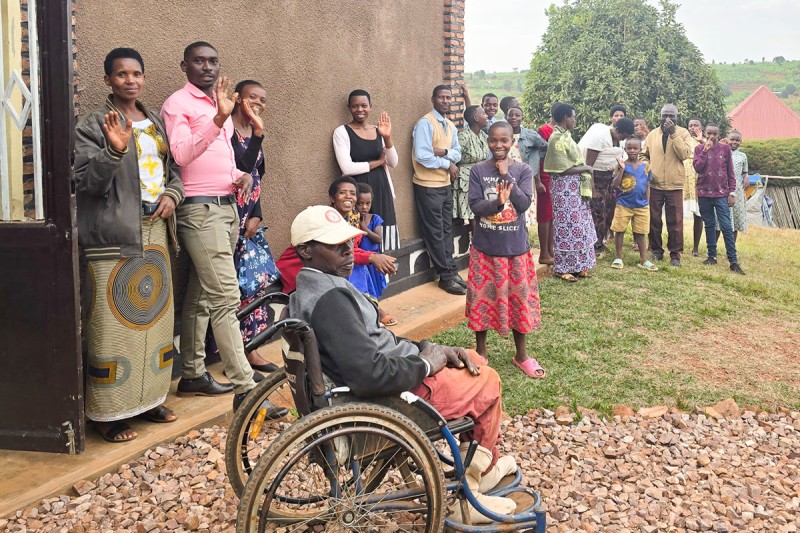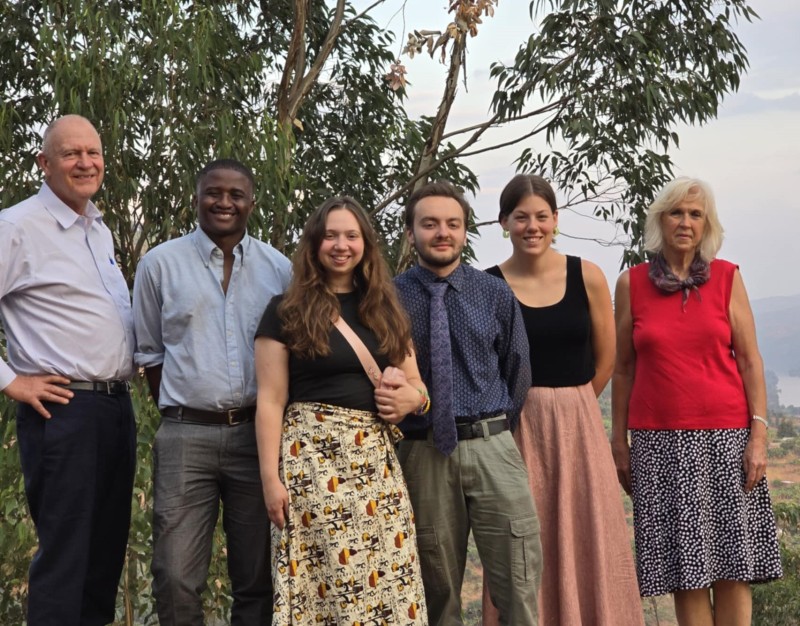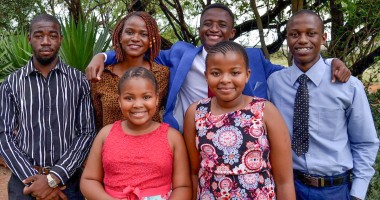What Volunteering in Rwanda Taught Me About Reconciliation
by Carl Demadema - November 12, 2025
Visiting Rwanda helped me understand the nation’s painful past, but it also taught lessons about forgiveness and moving forward after hurt and division.
Members of the Church of God, a Worldwide Association, in Rwanda. 
Countries like Chile, Argentina, South Africa and Canada have had truth and reconciliation commissions aimed at providing closure and promoting healing and unity in the population after nationwide atrocities.
Rwanda is no different; it had the Gacaca Courts (2001-2012), which were created to address the aftermath of the 1994 Rwandan genocide. The goal was to provide justice for genocide crimes and promote reconciliation.
Greg Swartz (the head dentist and leader of the Rwanda FOI project) took us volunteers to different genocide memorials. As we visited these memorials, with their very visceral sights and smells, I couldn’t help but wonder how the country was able to return to a state of normalcy and unity after such a devastating set of events.
The FOI volunteers in Rwanda. The author, Carl Demadema, is the second from the left. 
Months later, as I reflected on the times I have experienced rifts between myself and fellow brothers and sisters, I recalled the small spats, misunderstandings and instances where I or someone else had caused offense or made someone uncomfortable. I realized the importance of reconciliation in my relationships.
The Bible is clear that God desires unity among His people, and He expects us to take the steps necessary to promote that unity. Here are five important steps to help us pursue reconciliation with others when we have caused an offense or hurt.
1. Practice humble self-reflection.
When we visited one of the genocide memorial sites, we learned that some Rwandan Hutus acknowledged wrongdoing through the Gacaca Courts—sincerely seeking forgiveness—while others seeking only reduced sentences.
While the Rwandan government and various organizations have promoted reconciliation, genocide denial still exists among some groups, making full acknowledgment and healing an ongoing process.
Lamentations 3:40 reads: “Let us search out and examine our ways, and turn back to the LORD.”
The first step to any reconciliation is accepting the reality of our actions if we are the ones at fault. Acknowledging our role in a conflict doesn’t make us evil—it’s simply part of being human. Our instinct is often to be defensive and anxious about our interactions. That can stir up guilt and uncomfortable thoughts about ourselves, but it’s a battle many of us face within God’s family.
Psalm 139:23-24 expresses this beautifully: “Search me, O God, and know my heart; test me and know my anxious thoughts. See if there is any offensive way in me, and lead me in the way everlasting” (New International Version).
If God has revealed your faults—or if you have a sense of where things went wrong—accepting that truth is the first step. And if we’re still unsure of our error, we might seek insight from others.
2. Seek to make amends and apologize.
We learned from Patrick Mundeli and the genocide memorials that Rwanda addressed the aftermath of the genocide through a multifaceted approach: strict laws to help ensure accountability, national unity programs and focused efforts on economic recovery—which fostered healing and long-term stability.
This approach taught me the importance of making amends.
Something to consider about apologizing or making amends is the timing, circumstances and the other person’s readiness to receive it. A poorly timed or insincere apology can do more harm than good.
Proverbs 15:23 says, “A man has joy by the answer of his mouth, and a word spoken in due season, how good it is!” Thoughtful and well-timed words can bring healing, while rushed or careless ones can reopen wounds.
Ecclesiastes 3:7 reminds us that there is “a time to keep silence, and a time to speak.” True reconciliation requires discernment—recognizing that sometimes the other person may need space before he or she is ready to receive an apology.
Proverbs 25:11 highlights the impact of well-timed and thoughtful words: “A word fitly spoken is like apples of gold in settings of silver.” We must be intentional with our words, ensuring they express genuine remorse and a sincere desire to make things right.
3. Initiate an effective dialogue.
As the reconciliation commission and Gacaca Courts in Rwanda demonstrated, true reconciliation requires open and honest conversations—even when they’re difficult. Both sides must listen with the intent to understand, not simply to respond or defend their viewpoint.
Proverbs 18:13 says, “He who answers a matter before he hears it, it is folly and shame to him.” James 1:19 also reminds us, “So then, my beloved brethren, let every man be swift to hear, slow to speak, slow to wrath.”
Having hard conversations is what allows people to move forward; avoiding them only leaves issues unresolved. Sincere listening and directly addressing concerns are vital for real healing.
4. Have a heart of reconciliation and forgiveness.
During our time in Giti, Rwanda, Patrick Mundeli shared a deeply personal story about how his family faced threats during the genocide. As a Hutu, his father risked everything to hide four Tutsi students, two of whom were tragically found and butchered. Patrick’s mother, who is part Tutsi, was nearly killed as well. While fleeing to Goma, Congo, Patrick also lost a brother.
Despite this, Patrick speaks with hope about the new Rwanda, and his story is a testament to reconciliation and forgiveness—he is now married to a Tutsi woman and has two beautiful daughters. His journey shows that true healing comes from choosing forgiveness and embracing unity, even in the face of unimaginable tragedy and bloodshed.
Forgiveness and reconciliation are central to healing, as Jesus teaches in Matthew 6:14-15: “For if you forgive men their trespasses, your heavenly Father will also forgive you. But if you do not forgive men their trespasses, neither will your Father forgive your trespasses.” Similarly, Ephesians 4:32 reminds us, “And be kind to one another, tenderhearted, forgiving one another, even as God in Christ forgave you.”
True forgiveness isn’t easy, but it is essential for peace and healing in relationships and communities. It’s not just for those who have been hurt, but also for those who have caused hurt. Both sides must be willing to forgive and let go of the pain they carry in order to move forward.
5. Your actions are the most important thing.
Actions always speak louder than words, flowers, gifts or apologies. True reconciliation isn’t just about saying sorry—it’s about changing behaviors, attitudes and actions. We have to show, through consistent effort, that we’re committed to making things right and avoiding the same harmful behavior that caused the problem in the first place.
The apostle John wrote in 1 John 3:18, “My little children, let us not love in word or in tongue, but in deed and in truth.” If we’ve hurt someone, it’s essential for us to learn from the experience and make a sincere effort to grow and apply those lessons moving forward. Real love and reconciliation are shown by how we live, not just by what we say.
Though we are all moving toward the same destination—the Kingdom of God—we come from different backgrounds, cultures and life experiences. These differences can shape how we see things, how we respond and even how we interpret certain situations. That’s why it’s so important that we listen carefully to one another and be willing to accommodate each other when needed.
My time volunteering in Rwanda profoundly deepened my understanding of this subject. I was deeply moved by how, despite their painful past, the Rwandan people are striving to build a future rooted in love, reconciliation and peace.
The example of the Rwandan people’s efforts to forgive and heal can serve as a powerful example for us.
Continue Reading

Three Lessons I Learned From Saving
by Bellinda Simanjuntak - August 6, 2025

What It’s Like to Grow Up in Zimbabwe
by Carl Demadema - July 29, 2025
